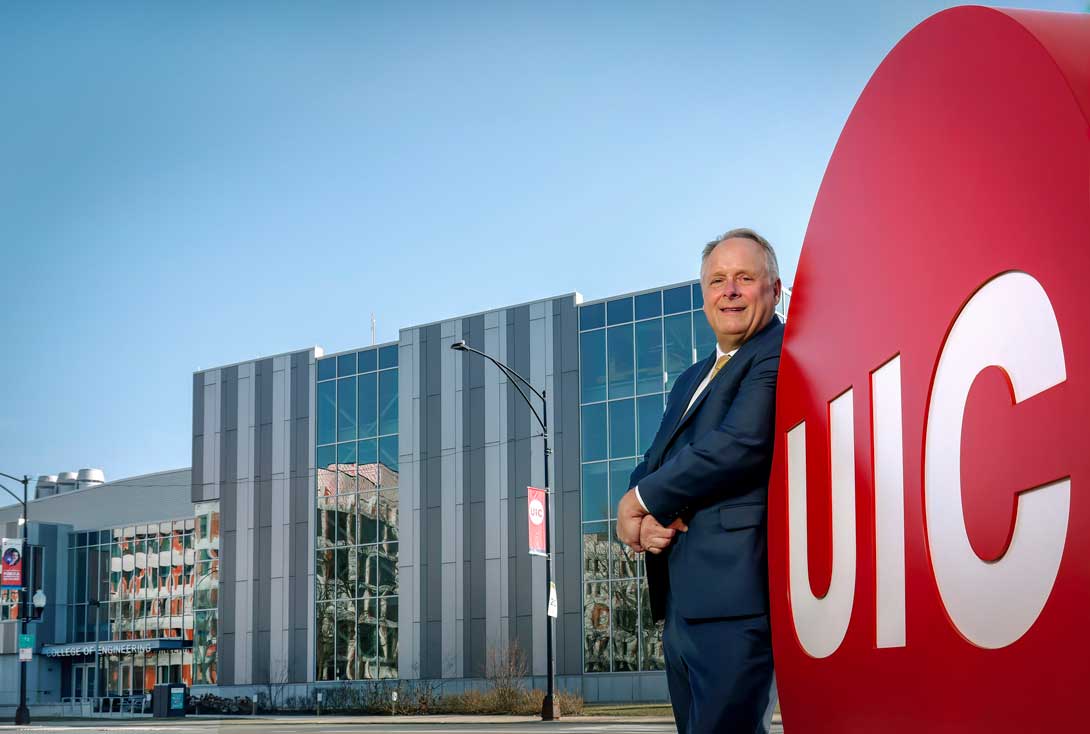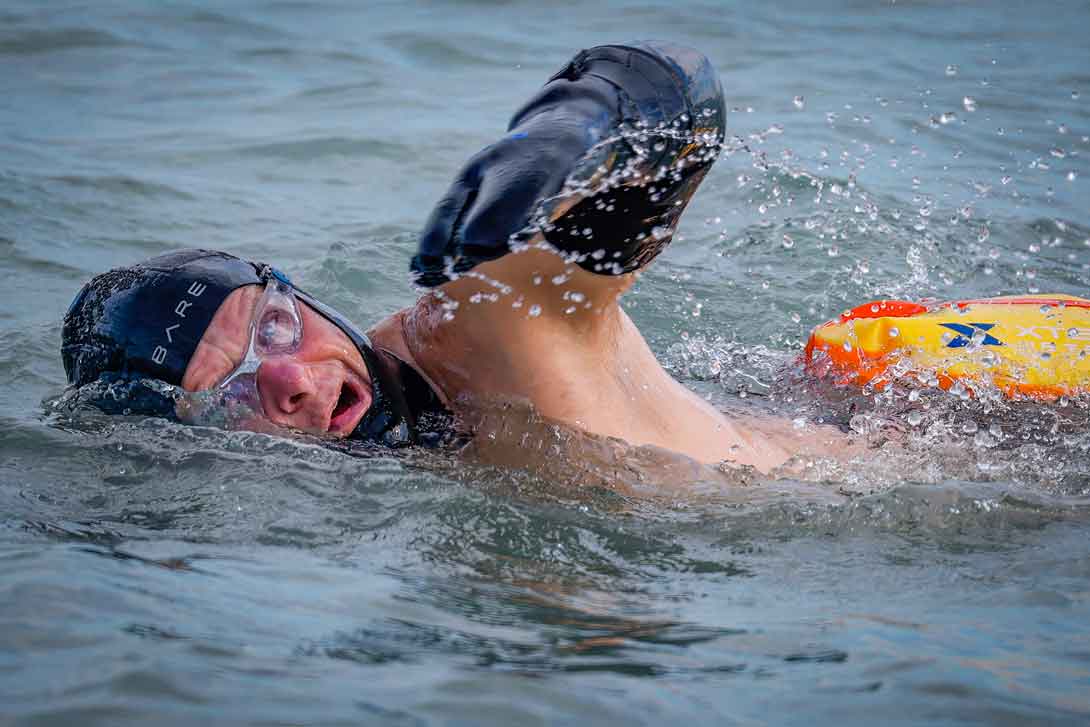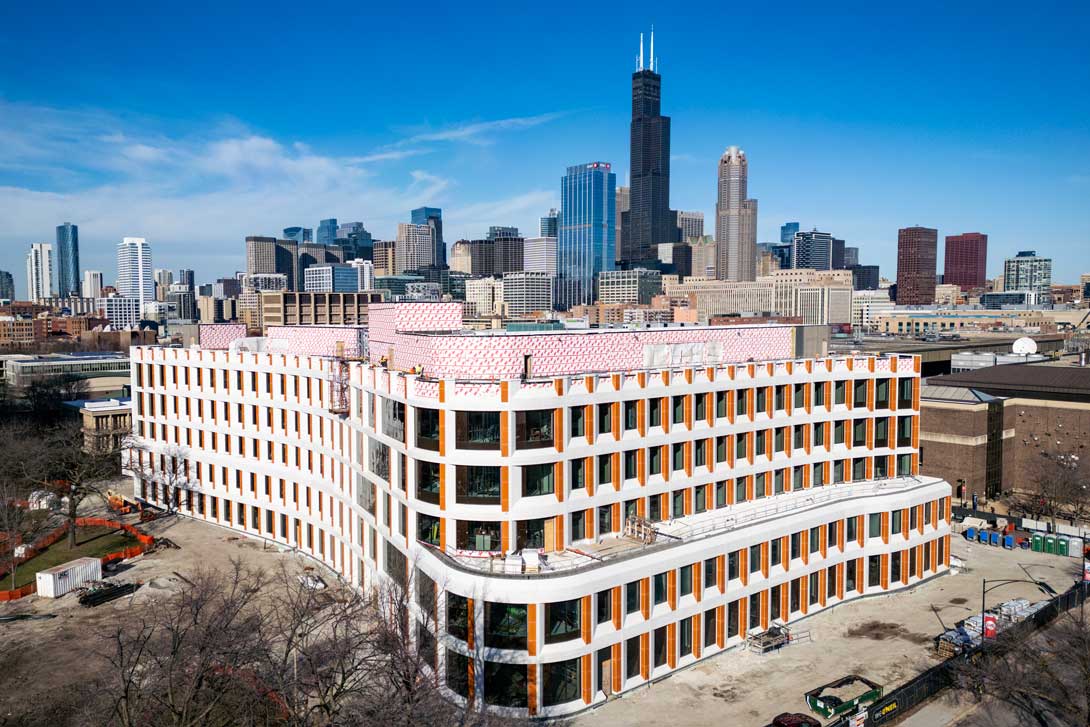Reflections of a rewarding deanship
This August, Peter Nelson will step down as dean of UIC’s College of Engineering after 17 years in the role, returning to the computer science faculty.
Nelson has accomplished much in the role, from continuous student enrollment growth, realigning biomedical engineering under the College of Engineering and the College of Medicine, and the construction of two new buildings on campus.
This list is a small sampling of what Nelson has achieved as dean and is a testament to his leadership and commitment to the university. But Nelson is quick to point out that the success of the college has been a team effort - with faculty, staff, students, and alumni all contributing.
One of Nelson’s frustrations is his inability to get to know every member of the ever-growing roster of staff and faculty members in the college, the way he was able to when the college was smaller. To ameliorate this, Nelson has instituted meetings with new faculty, hosting 19 lunches with multiple faculty so far this year, and Fika, or Swedish coffee breaks, with staff. His larger goal is for all in the College to get to know and value one another.
“We need to appreciate the people around us, realizing that by and large, they’re good people who are trying to do something positive. We still have as much to learn as the people around us,” Nelson said.
First part Heading link

The path to UIC
Nelson was raised in the Seattle area and earned his bachelor’s degree in mathematics and computer science from North Park University and his master’s and doctoral degrees in computer science from Northwestern University. He joined the UIC faculty in 1988, intending to stay at the university for just a few years; he and his wife Melissa wanted to move closer to both his family in Washington state, and her family in Colorado. However, he’s been with UIC 35 years and counting.
Nelson founded the Artificial Intelligence Laboratory at UIC in 1990, concentrating on applied AI projects useful to society. These include the National Institute of Health-funded research on the human genome project, spam countermeasures, and the 16 Feature Story Feature Story Photograph: Jim Young lab’s most enduring project, the Intelligent Transportation Systems. Nelson’s R&D team developed the first real-time traffic map on the Web in the mid-1990s, long before Google Maps or Waze came into existence. His lab works with the Illinois Department of Transportation to improve the utilization and efficiency of existing roadway transportation systems. The tool logs over 11 million users per year.
During his career, he has received $63 million in external grants, including more than $45 million as principal investigator.
He served as the inaugural department head of computer science when the discipline split from electrical and computer engineering in 2001. He then served as interim dean for the college in 2007 and was named permanent dean in 2008.
“Some of my colleagues suggested I consider applying to be the department head. For a faculty member, I had some good human resources and budgeting experience, and I seemed to get along with people in the department,” Nelson said. “I felt like my interests and talents were better used to help other people around me be productive rather than maximize my own scientific or scholarly output.”
Michael Amiridis Heading link
Pete is an outstanding researcher and an excellent leader of the College of Engineering. During his tenure the size and reputation of the College have increased significantly, and new facilities were built for computer science and chemical engineering.
| President, University of South Carolina and former UIC chancellor
Second part Heading link
Miiri Kotche, a clinical professor in the biomedical engineering department, sees firsthand what Nelson has done for the college.
“Pete has been a great role model as dean. He has always been fair, student-centric, and transparent as a leader, and has been especially supportive in growing the professional development opportunities for teaching-track faculty,” Kotche said.
Nelson’s long tenure as a dean is a bit of an anomaly; most people who make it to this level in higher education go through several universities to get to this point. Accomplishing significant successes takes time and involves building relationships. Nelson is a huge champion of UIC, maintaining strong relationships with the college’s external advisory board, whose past and present members have given well over $25 million during his tenure.
Jeffrey S. Niew, president and CEO of Knowles, and chairman of the College’s Advisory Board, lauded Nelson for his work as dean.
“His leadership in moving the College forward, in terms of size, prestige, research dollars – aspects that are very important – has been outstanding,” Niew said. “He’s been very proactive in reaching out to the business community and presenting innovative ideas.”
Poser Heading link
Pete has been an outstanding dean. He is one of those rare deans who is able both to exhibit complete dedication to his college and its faculty while also continuing a robust research program of his own as a faculty member. During my time as UIC provost, Pete was often the most highly funded faculty member in the College, all while being an effective dean, constantly and successfully advocating for his college. In a word, he walked the walk, though I doubt he slept much. The growth in enrollment, faculty, and the reputation of the College during his time, as well as the beautiful new building, are his legacy and will be felt for decades to come at UIC.
| President, Hofstra University
Third part Heading link

Commitment to the mission
Nelson spends a lot of time educating folks around the university, city, state, and country about the quality of programs, faculty, and students in the College.
“You have to really believe in the cause yourself. If it’s not worth your own money and time, how can you effectively sell it to others?” Nelson said.
He has worked hard to improve the student experience at UIC and the diversity of the student body. The college has had significant enrollment growth during his tenure, from just over 2,700 students to over 6,200 in the fall of 2023.
The graduation and retention rates for all engineering students have increased consistently as well.
The percentage of underrepresented students climbed from 21.8% to 33.6%, and enrollment of women has risen substantially, from 18.8% percent of the College in 2013 to 25.6% in 2023.
The College has also increased access for economically disadvantaged students. In 2017, the College received a $1.167 million grant from the National Science Foundation Scholarships in Science, Technology, Engineering, and Mathematics Program, known as S-STEM. The program was created in response to growing evidence suggesting that students from low-income backgrounds have lower graduation rates and are less likely to find jobs in their respective fields than their peers from higher-income families.
Barbara J. Wilson Heading link
I had the pleasure of working with Pete during the five years I served as executive vice president and vice present for academic affairs for the University of Illinois System. It is extremely rare to have a dean serve as long as he has, and to have a record of research productivity and external funding like his, while also serving as an academic leader, is nothing short of remarkable.
| President of the University of Iowa
Fourth part Heading link
“Pete’s effective support and key contributions were critical components leading to the strong success of the S-STEM program. The program developed and applied a series of evidence-based intervention systems to financially and academically support 50 low-income, academically talented College of Engineering undergraduate students,” said Houshang Darabi, professor and a core investigator for S-STEM at UIC. “This resulted in a 90% six-year graduation rate for the supported students; a huge success as similar students not supported by this program have a lower graduation rate.”
Nelson instituted the college’s Guaranteed Paid Internship Program, which provides freshman and transfer students the opportunity for paid summer work and experience for their resumes.
“The Guaranteed Paid Internship Program has been a big step forward for the university,” Niew said. “The promotion of women in engineering and increasing the diversity of the engineering community has been a goal of the board. Pete has been outstanding; the person who comes into this role next will have some very big shoes to fill.”
Mun Y. Choi Heading link
Pete Nelson has been a transformational leader for UIC. He elevated the stature and impact of the College to become one of the finest institutions in the country. His focus on student success and research breakthroughs is truly commendable. And he did all of this with grace and humility. I’m proud to call him a friend.
| President of the University of Missouri and former UIC associate professor
fifth part Heading link

Building the future
With the growing student body and faculty, more space was needed on campus. As a result of the college’s 2025 10-year strategic plan, the Engineering Innovation Building was built, and later this year, the 127,000-square-foot Computing Design Research and Learning Center will open, the first state-appropriated academic building on the east campus in over 30 years.
Timothy L. Killeen Heading link
Pete has devoted much of his life to UIC and has been a driving force in growing its College of Engineering and ensuring its excellence. Since he was appointed dean in 2008 and in his years before that working as head of the Department of Computer Science, he has continually set higher and higher standards, and met them,” Killeen said. “Pete also has a stellar track record as a researcher and innovator. Think about his work that drove the creation of the very first real-time traffic congestion map – that was almost three decades ago, and it’s still in use today. I’d also add that UIC’s Artificial Intelligence Laboratory exists today to a large degree because of Pete’s drive, ambition, and commitment to UIC.
| University of Illinois System president
Sixth part Heading link
What’s next
After stepping down, Nelson plans to focus on his research, looking to complete some new big proposals and on integrating the AI Lab into the broader context of research across campus.
“I’ve always had a lot to learn, and I still have a lot to learn, and that’s just been exciting. Being dean has been a wonderful experience,” Nelson said. “I look forward to having time to connect with more of the great people around UIC when I step down.”
Outside of UIC, Nelson looks forward to devoting more time to his passion for open-water swimming. He began swimming as a child and started open-water swimming in the Puget Sound area as a teenager. Nowadays, he swims in Lake Michigan year-round, joking that the group he swims with dwindles to three as the temperatures dip. He hopes to bring more people into the sport and enjoys the city’s open water swimming community. He also looks for opportunities to swim when he travels, recently completing an Alcatraz night swim in San Francisco, as well as swimming in the South China Sea, Tokyo Bay, and Lake Ontario.
Reflecting on his career at UIC and his life philosophy in general, Nelson again returned to his love of the people at UIC, and those in his personal orbit.
“I love all the numbers, I’m a data person,” Nelson said. “I love the quantitative measurements and qualitative that can show our success. But you know, I really love the people. This is the thing I like about this job the most.”
Edward Seidel Heading link
Pete has had such an incredible impact on UIC, in engineering and beyond. It was always a pleasure to work with Pete and I wish him the best in his new chapter.
| President of the University of Wyoming | Former vice president for economic development and Innovation for the University of Illinois System